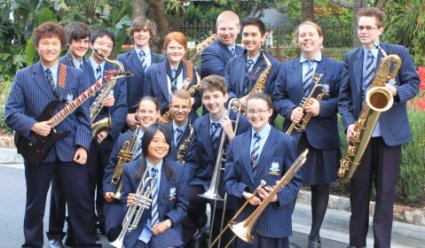- > All Saints Anglican School (Merrimac, Queensland)
- > Citipointe Christian College (Brisbane, Queensland)
- > Clayfield College (Brisbane, Queensland)
- > Lourdes Hill College (Brisbane, Queensland)
- > Macquarie Grammar School (Sydney, New South Wales)
- > St Aidan’s Anglican Girls’ School Study Experience for International Students, Brisbane, Queensland
- > St Aidan’s Anglican Girls’ School, Brisbane, Queensland
- > St Paul's School (Bald Hills, Queensland)
- > St Pauls School 2021 Australian Vacation School Experience
- > South Australian Government Schools (Adelaide, South Australia)
- > Geelong College (Geelong, Victoria)

Also see our summer programmes (July - August) in Queensland and South Australia
School education (Primary and Secondary)
School education is similar across all of Australia with only minor variations between states and territories. School education (primary and secondary) is compulsory between the ages of six and sixteen (Year 1 to Year 9 or 10). School education is 13 years and divided into:
Primary School
Children attend primary school from approximately the age of 5 to 11 years. Classes are usually comprised of boys and girls together, sometimes less so in private schools, and pupils usually remain in the same class for all their lessons. A full range of subjects is normally taught by a single teacher.
Secondary School
From the age of about 12 to about 16-17, pupils attend secondary school. Some schools divide into "junior" and "senior" schools in recognition of the different roles they play in the overall education system. In Australia, schooling is compulsory up until Year 10 (approximately age 15-16). Students leaving school at this level usually go into apprenticeships or begin training for a trade. Years 11 and 12, the final two years of secondary school in Australia, are designed to prepare students for higher level entry into training programs or to enter university. Most international students coming to Australia for secondary education, do so for Years 11 and 12, normally with the intention of furthering their study at an Australian tertiary institution. On successful completion of Year 12, students are issued with a Senior Secondary Education Certificate. In Australia each State gives this award a different name, but they all denote the same level of education and are mutually recognized by each different State. Some schools also offer international award programs such s the International Baccalaureate (IB) as an alternative to the Year 12 school-leaver certificate.
In the Australian school system, there are two types of schools. Both types of school must meet the Australian Government standards.
Government schools (public)
These schools are under the authority of the State Department of Education and are regulated by a centralised Government body. Governments offer a strong platform of education without a religious denomination behind it, but will include a similar curriculum as an independent school.
Most Government schools are co-educational (both boys and girls). Only a few schools are single sex (only boys or only girls).
Independent schools (private)
An independent school operates separately from Government administration – while in accordance with Government standards and regulations – as their curriculum is often supported by a religious denomination. Funding comes primarily from the schools administration, and the school is controlled by a school board. Independent schools may also offer the International Baccalaureate (IB) along with the Senior Secondary Certificate of Education.
Independent schools may be co-educational (boys and girls) or single sex (only boys or only girls).
Accommodation options
International students at Government schools are likely to live in homestay arrangements. Homestay means staying with a local Australian family for a fee. Your school can assist in arranging homestay with a family that suits your child. Homestay means security as your child is living in a family environment with responsible adults.
Independent schools usually have boarding school facilities on campus or near the school. Boarding usually means sharing a dormitory or room. In some schools, final year students have their own room. Students are given all meals and have common lounge-room and entertainment facilities. In a boarding house, students are supervised at all times. Some independent schools may also arrange homestay accommodation.
For more information, please write to us at StudyAustralia EU <- click for e-mail


